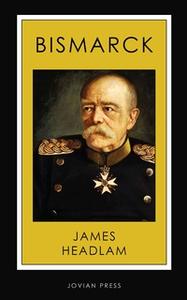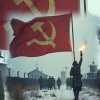Otto Eduard Leopold von Bismarck was born at the manor-house of Schoenhausen, in the Mark of Brandenburg, on April 1, 1815. Just a month before, Napoleon had escaped from Elba; and, as the child lay in his cradle, the peasants of the village, who but half a year ago had returned from the great campaign in France, were once more called to arms.
A few months passed by; again the King of Prussia returned at the head of his army; in the village churches the medals won at Waterloo were hung up by those of Grossbehren and Leipzig. One more victory had been added to the Prussian flags, and then a profound peace fell upon Europe; fifty years were to go by before a Prussian army again marched out to meet a foreign foe.
The name and family of Bismarck were among the oldest in the land. Many of the great Prussian statesmen have come from other countries: Stein was from Nassau, and Hardenberg was a subject of the Elector of Hanover; even Blücher and Schwerin were Mecklenburgers, and the Moltkes belong to Holstein. The Bismarcks are pure Brandenburgers; they belong to the old Mark, the district ruled over by the first Margraves who were sent by the Emperor to keep order on the northern frontier; they were there two hundred years before the first Hohenzollern came to the north.
Herbort von Bismarck
The first of the name of whom we hear was Herbort von Bismarck, who, in 1270, was Master of the Guild of the Clothiers in the city of Stendal. The town had been founded about one hundred years before by Albert the Bear, and men had come in from the country around to enjoy the privileges and security of city life. Doubtless Herbort or his father had come from Bismarck, a village about twenty miles to the west, which takes its name either from the little stream, the Biese, which runs near it, or from the bishop in whose domain it lay.
He was probably the first to bear the name, which would have no meaning so long as he remained in his native place, for the von was still a mark of origin and had not yet become the sign of nobility. Other emigrants from Bismarck seem also to have assumed it; in the neighbouring town of Prenzlau the name occurs, and it is still found among the peasants of the Mark; as the Wends were driven back and the German invasion spread, more adventurous colonists migrated beyond the Oder and founded a new Bismarck in Pomerania.
Early Life (1821-1847)
Of the boy’s early life we know little. His mother was ambitious for her sons; Otto from his early years she designed for the Diplomatic Service; she seems to have been one of those women who was willing to sacrifice the present happiness of her children for their future advancement. When only six years old the boy was sent away from home to a school in Berlin. He was not happy there; he pined for the free life of the country, the fields and woods and animals; when he saw a plough he would burst into tears, for it reminded him of his home. The discipline of the school was hard, not with the healthy and natural hardships of life in the open air, but with an artificial Spartanism.
It was probably at this time that there was laid the foundation of that dislike for the city of Berlin which Bismarck never quite overcame; and from his earliest years he was prejudiced against the exaggerated and affected Teutonism which was the fashion after the great war. A few years later his parents came to live altogether in the town; then the boy passed on to the Gymnasium, boarding in the house of one of the masters.
The teaching in this school was supplemented by private tutors, and he learned at this time the facility in the use of the English and French languages which in after years was to be of great service to him. The education at school was of course chiefly in the classical languages; he acquired a sufficient mastery of Latin.
There is no evidence that in later life he continued the study of classical literature. In his seventeenth year he passed the Abiturienten examination, which admitted him as a student to the university and entitled him to the privilege of serving in the army for one instead of three years. His leaving certificate tells us that his conduct and demeanour towards his comrades and teachers were admirable, his abilities considerable, and his diligence fair.
University of Göttingen
The next year he passed in the ordinary course to the university, entering at Göttingen; the choice was probably made because of the celebrity which that university had acquired in law and history. It is said that he desired to enter at Heidelberg, but his mother refused her permission, because she feared that he would learn those habits of beer-drinking in which the students of that ancient seat of learning have gained so great a proficiency; it was, however, an art which, as he found, was to be acquired with equal ease at Göttingen.
The young Bismarck was at this time over six feet high, slim and well built, of great physical strength and agility, a good fencer, a bold rider, an admirable swimmer and runner, a very agreeable companion; frank, cheerful, and open-hearted, without fear either of his comrades or of his teachers. He devoted his time at Göttingen less to learning than to social life; in his second term he entered the Corps of the Hanoverians and was quickly noted for his power of drinking and fighting; he is reported to have fought twenty-six duels and was only wounded once, and that wound was caused by the breaking of his opponent’s foil. He was full of wild escapades, for which he was often subjected to the ordinary punishments of the university.

St. Petersburg & Paris (1858-1862)
Bismarck when he went to Frankfort was thirty-six years of age; he had had no experience in diplomacy and had long been unaccustomed to the routine of official life. He had distinguished himself by qualities which might seem very undiplomatic; as a Parliamentary debater he had been outspoken in a degree remarkable even during a revolution; he had a habit of tearing away the veil from those facts which everyone knows and which all wish to ignore; a careless good-fellowship which promised little of that reserve and discretion so necessary in a confidential agent; a personal and wilful independence which might easily lead him into disagreement with the Ministers and the King.
He had not even the advantage of learning his work by apprenticeship under a more experienced official; during the first two months at Frankfort he held the position of First Secretary, but his chief did not attempt to introduce him to the more important negotiations and when, at the end of July, he received his definite appointment as envoy, he knew as little of the work as when he arrived at Frankfort.
He had, however, occupied his time in becoming acquainted with the social conditions. His first impressions were very unfavourable. Frankfort held a peculiar position. Though the centre of the German political system it was less German than any other town in the country.
The conflict (1862-1863)
The circumstances under which Bismarck accepted office were such as to try the nerves of the strongest man. The King had not appealed to him so long as there was anyone else who would carry on the Government; he was the last resource, and had taken up a burden from which all others shrunk. He had pledged himself to support the King in a conflict against the whole nation; with the exception of the Upper House he had no friends or supporters.
The opinion in Europe was as decisively against him as that in Prussia; he was scarcely looked on as a serious politician; everyone believed that in a few weeks he would have to retire, and the King to give up the useless conflict on which he was staking his throne.
Bismarck was under no illusion as to his position; he had been summoned by the King, he depended for his office entirely on the King, but would the King have the strength of will and courage to resist? Only a few days after his appointment, the King had gone to Baden-Baden for a week, where he met the Queen. When he came back, he was completely disheartened. Bismarck, who had travelled part of the way to meet him, got into the train at a small roadside station.
He found that the King, who was sitting alone in an ordinary first-class carriage, was prepared to surrender. “What will come of it?” he said. “Already I see the place before my castle on which your head will fall, and then mine will fall too.” “Well, as far as I am concerned,” answered Bismarck, “I cannot think of a finer death than one on the field of battle or the scaffold. I would fall like Lord Strafford; and your Majesty, not as Louis XVI., but as Charles I. That is a quite respectable historical figure.”
At the beginning of February the Poles had once more risen in revolt against the Russian Government. Much sympathy was felt for them in Western Europe. England, France, and Austria joined in representations and remonstrances to the Czar; they expected that Prussia would join them.
The Polish Revolt
Nothing could have been more inconvenient to Bismarck; he was at the time fully occupied in negotiations about German affairs, and he was probably anxious to bring to a speedy issue the questions between Prussia and Austria; it was therefore most important to him to be on good terms with France and England, for he would not challenge Austria unless he was sure that Austria would have no allies; now he must quarrel with either Russia or with France. An insurrection in Poland was, however, a danger to which everything else must be postponed; on this his opinion never varied, here there could be no compromise.
He was perfectly open: “The Polish question is to us a question of life and death,” he said to Sir Andrew Buchanan. There were two parties among the Poles; the one, the extreme Republican, wished for the institution of an independent republic; the other would be content with self-government and national institutions under the Russian Crown; they were supported by a considerable party in Russia itself. Either party if successful would not be content with Russian Poland; they would demand Posen, they would never rest until they had gained again the coast of the Baltic and deprived Prussia of her eastern provinces.
The danger to Prussia would be greatest, as Bismarck well knew, if the Poles became reconciled to the Russians; an independent republic on their eastern frontier would have been dangerous, but Polish aspirations supported by the Panslavonic party and the Russian army would have been fatal. Russia and Poland might be reconciled, Prussia and Poland never can be.
Prussia therefore was obliged to separate itself from the other Powers; instead of sending remonstrances to the Czar, the King wrote an autograph letter proposing that the two Governments should take common steps to meet the common danger; General von Alvensleben, who took the letter, at once concluded a convention in which it was agreed that Prussian and Russian troops should be allowed to cross the frontier in pursuit of the insurgents; at the same time two of the Prussian army corps were mobilised and drawn up along the Polish frontier.
Isolation of Prussia
The convention soon became known and it is easy to imagine the indignation with which the Prussian people and the House of Representatives heard of what their Government had done. The feeling was akin to that which would have prevailed in America had the President offered his help to the Spanish Government to suppress the insurrection in Cuba. The answers to questions were unsatisfactory, and on February 26th Heinrich von Sybel rose to move that the interests of Prussia required absolute neutrality.
It was indeed evident that Bismarck’s action had completely isolated Prussia; except the Czar, she had now not a single friend in Europe and scarcely a friend in Germany. Bismarck began his answer by the taunt that the tendency to enthusiasm for foreign nationalities, even when their objects could only be realised at the cost of one’s own country, was a political disease unfortunately limited to Germany.
It was, however, an unjust taunt, for no one had done more than Sybel himself in his historical work to point out the necessity, though he recognised the injustice, of the part Prussia had taken in the partition of Poland; nobody had painted so convincingly as he had, the political and social demoralisation of Poland. Bismarck then dwelt on the want of patriotism in the House, which in the middle of complicated negotiations did not scruple to embarrass their own Government. “No English House of Commons,” he said, “would have acted as they did,” a statement to which we cannot assent; an English Opposition would have acted exactly as the majority of the Prussian Parliament did.
The irreconcilable enemy of Prussia
When a Minister is in agreement with the House on the general principles of policy, then indeed there rests on them the obligation not to embarrass the Government by constant interpolation with regard to each diplomatic step; self-restraint must be exercised, confidence shewn. This was not the case here; the House had every reason to believe that the objects of Bismarck were completely opposed to what they wished; they could not be expected to repose confidence in him. They used this, as every other opportunity, to attempt to get rid of him.
The question of Poland is one on which Bismarck never altered his attitude. His first public expression of opinion on foreign affairs was an attack on the Polish policy of the Prussian Government in 1848.
“No one then,” he wrote, “could doubt that an independent Poland would be the irreconcilable enemy of Prussia and would remain so till they had conquered the mouth of the Vistula and every Polish-speaking village in West and East Prussia, Pomerania, and Silesia.”
Forty years later one of the last of his great speeches in the Reichstag was devoted to attacking the Polish sympathies of the Catholic party in Prussia. He was never tired of laughing at the characteristic German romanticism which was so enthusiastic for the welfare of other nations. He recalled the memories of his boyhood when, after the rebellion of 1831, Polish refugees were received in every German town with honours and enthusiasm greater than those paid to the men who had fought for Germany, when German children would sing Polish national airs as though they were their own.
src. Bismarck by James Headlam. Delve deeper with this excellent read!





